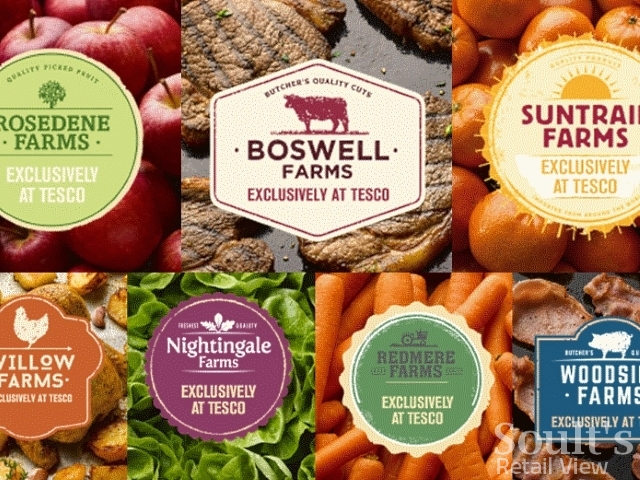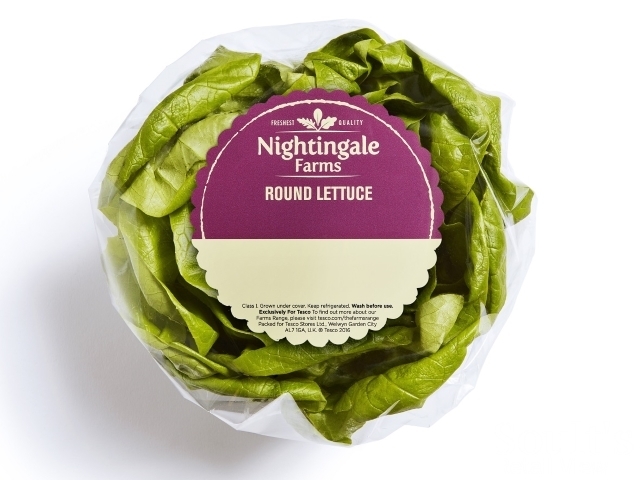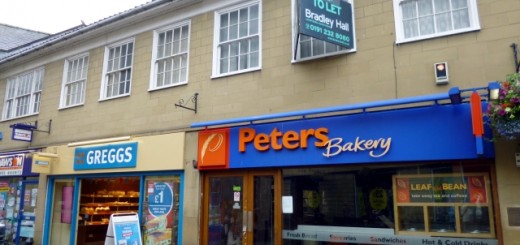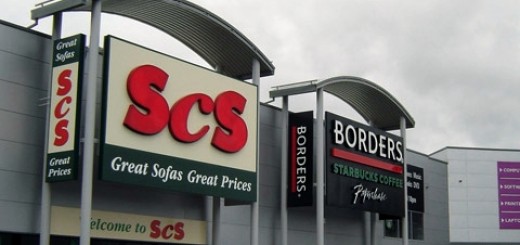Tesco launches new fresh lines “to ensure that customers never need to shop anywhere else”

Tesco’s new fresh brands, instore from today
From horsemeat and accounting to store closures, it’s fair to say that Tesco hasn’t had the headlines all its own way over the last few years.
Beyond the front pages, however, new boss Dave Lewis – appointed in July 2014 – has been gaining plaudits for steadying, and even starting to turn around, the business. Like-for-like sales rose 1.3% over Christmas – driven by what Lewis said was more price cuts and staff instore – while the retailer’s market share seems to be stabilising after a long period of decline.
The changing grocery market
Of course, when you look at which grocers have been gaining at Tesco’s expense, a clear pattern emerges. Kantar Worldpanel data shows that while there’s been a 1.9-point fall in Tesco’s share (from 30.3% to 28.4%) since June 2013, Aldi’s has grown from 3.6% to 5.8%, leapfrogging Waitrose. Fellow discounter Lidl has also thrived, and now commands 4.2% of the market compared to 3.0% three years ago.
It’s not just Tesco that has suffered from the rise of Aldi and Lidl, though. Morrisons and Asda have both lost share (and arguably faced a wider battle to persuade customers why they should shop there), with Sainsbury’s the only one of the big four supermarkets to hold its own – buoyed by having a stronger reputation for quality at the same time as successfully communicating price competitiveness via its Brand Match.
76 new fresh lines instore

Lettuce from the Nightingale Farms salad range
Against this market backdrop, it’s perhaps not surprising that Tesco’s latest initiative – going instore from today (21 March) – seeks to tackle this price versus quality issue head on.
Shoppers will find 76 new lines across seven new and exclusive produce, meat and poultry brands, offering what Tesco says is “very competitive prices that – in many cases – either match or are below all our competitors [and] meet the need for a new level of quality at great prices.”
Each brand, Tesco explains, “is focused on delivering high quality fresh food for customers, sourced with care from a range of trusted suppliers.”
The new brands themselves are, as Telegraph features writer Harry Wallop has alluded to this morning, perhaps rather generic and, clearly, fictional, which arguably makes that connection with “trusted suppliers” harder for the consumer to make – though Tesco is clear that all the featured products come from respected, audited farms:
- Redmere Farms – Vegetables
- Suntrail Farms – Imported Fruit
- Rosedene Farms – Berries, Apples and Pears
- Nightingale Farms – Salad
- Woodside Farms – Pork
- Willow Farms – Chicken
- Boswell Farms – Beef.
So, @Tesco where exactly in UK are 'Willow Farms', 'Rosedene Farms' or 'Woodside Farms'? https://t.co/fBIGrZt5oT
— Harry Wallop (@hwallop) March 21, 2016
Equally, some might question how this latest move sits with the ‘range reset’ that has been underway in Tesco over the last year or so, as growing numbers of consumers eschew the big supermarkets’ occasionally bewildering choice in favour of Aldi-style simplicity.
@soult @Tesco Sure I read in the Grocer that Tesco was cutting brands, last year?
— Lee Beaumont (@LeeTheLad) March 21, 2016
Tesco, I suspect, would argue that these new brands are about making its ranges easier for shoppers to navigate, and conveying a quality value positioning that is distinct from the existing Everyday Value, core and Finest ranges.
Indeed, I understand that some Everyday Value items have been removed where they duplicate these new brands.
As Tesco explained to me, “we need to give customers both great quality and better prices – particularly when it comes to fresh food. [These] brands convey the quality specifications that go into every product across the range, and are long-term sustainable additions to our range that address the need for quality fresh food, at a very keen price.”
Building on the ‘Festive Five’
The latest move can also be seen as an extension of Tesco’s successful Festive Five promotion last Christmas, which featured five different fresh vegetables for 39p each, and is credited with helping the retailer defend itself more strongly than expected against the discounter onslaught. Tellingly, Tesco told me that “at Christmas, we saw that when it mattered the most customers still liked shopping in one place, and this is why we are working hard to ensure that customers never need to shop anywhere else.”
Those of us with long memories will remember, of course, that Tesco has experimented with Aldi-style non-own-brand own-brands before, launching brands such as Daisy washing powder (with a Tesco reference in small print) back in 2008, with mixed success.
While there is merit in drawing inspiration from the best of what Aldi does, Tesco has a completely different store estate and position in the market, and Dave Lewis seems to have recognised that there are areas where Tesco can not only compete with the discounters but potentially outperform them – such as in its renewed focus on customer service, the quality of the instore experience, and the transparency of the Brand Guarantee in matching prices against Asda, Morrisons and Sainsbury’s.
A game-changer in convenience?
One area of the market in which Tesco has an advantage over all its competitors is in the convenience space, with upwards of 2,000 Tesco Express stores in the UK – and this is particularly where these new brands might just be a game changer.
Customers have tended to accept that convenience comes at a premium, but I understand that wherever they are stocked, these 76 new lines will be priced the same across all Tesco formats – so, customers will pay the same in an Express or Metro store as they do in a supermarket or Extra. Clearly, not all 76 lines will appear in Express stores, however.
So, all in all it’s an interesting step from Tesco. The retailer will be hoping that this new set of own-brands based around quality, value and provenance (albeit with a fictional slant) will persuade shoppers to visit its larger stores more often and to spend more while they’re there – and, implicitly, to frequent Aldi and Lidl less.
If the brands can manage that, at the same time as providing a bonus boost to footfall and sales in Tesco Express stores, it could be a key step in helping Tesco reverse its declining market share – and make the most of a vast and varied estate, that has, in recent years, been framed more as a burden than an opportunity.
My retail consultancy business, CannyInsights.com, provides bespoke place- and sector-specific market intelligence, including coverage of variety store retailing and of all parts of the UK. It also works with retailers nationwide to improve their stores and marketing. For more information, visit www.cannyinsights.com, drop me an email, or give me a call on (0191) 461 0361.










Never needing to shop somewhere else is a big call to convenience that isn’t going away. I think the continuation of their success from the holidays is wise decision as the continue to release new lines of product and inventory. The risk is otherwise losing customers to deep discounters.